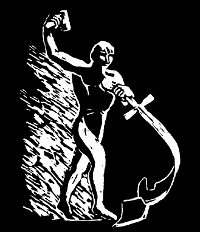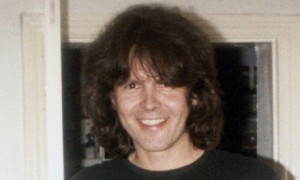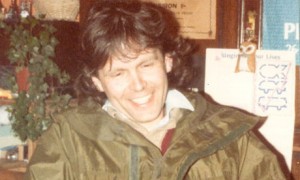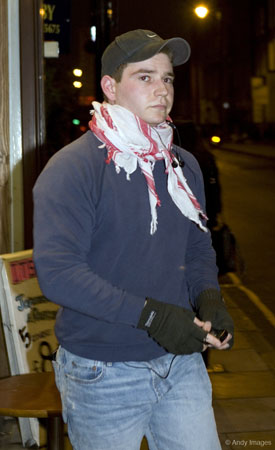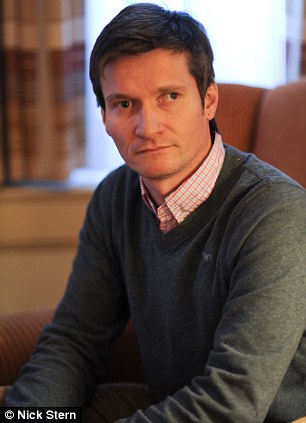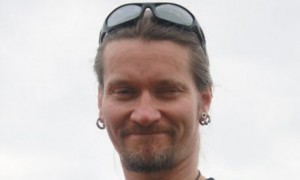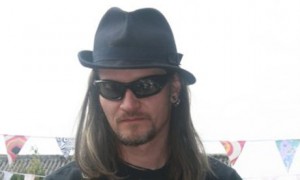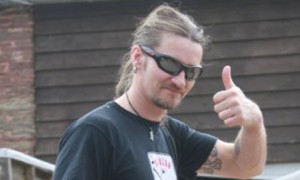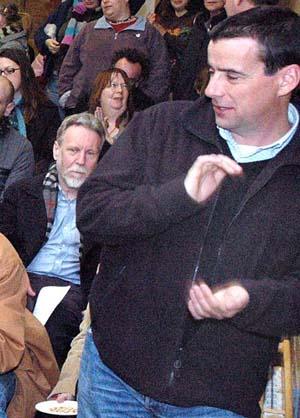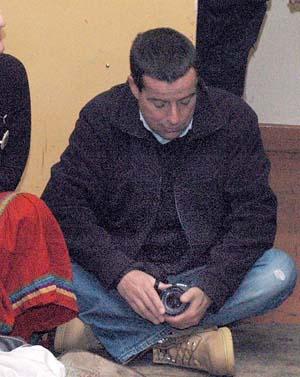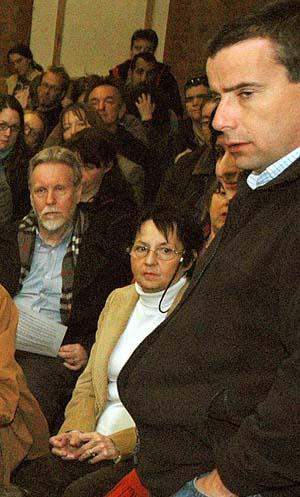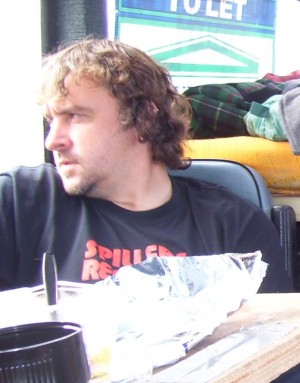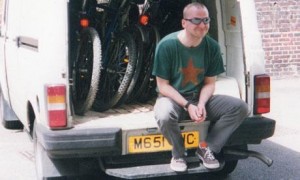Mark “Stone” / Kennedy
The account of Mark Kennedy / Stone has been well documented in the Guardian and in the interviews he gave to the Mail on Sunday. Many of the articles can be found at http://www.guardian.co.uk/environment/mark-kennedy with key ones being given below.
Original expose on Indymedia
PowerBase
Chronology of known activities
Article 1
Undercover officer spied on green activists
Guardian investigation reveals details of PC Mark Kennedy’s infiltration of dozens of protest groups
Rob Evans & Paul Lewis, 9 January 2011, http://www.guardian.co.uk/uk/2011/jan/09/undercover-office-green-activists
A police officer who for seven years lived deep undercover at the heart of the environmental protest movement, travelling to 22 countries gleaning information and playing a frontline role in some of the most high-profile confrontations, has quit the Met, telling his friends that what he did was wrong.
PC Mark Kennedy, a Metropolitan police officer, infiltrated dozens of protest groups including anti-racist campaigners and anarchists, a Guardian investigation reveals.
Legal documents suggest Kennedy’s activities went beyond those of a passive spy, prompting activists to ask whether his role in organising and helping to fund protests meant he turned into an agent provocateur.
Kennedy first adopted the fake identity Mark Stone in 2003, pretending to be a professional climber, in order to disrupt the UK’s peaceful movement to combat climate change. Then aged 33, he grew long hair and sported earrings and tattoos, before going on to attend almost every major demonstration in the UK up to the G20 protests in London. He was issued with a fake passport and driving licence.
Sensitive details about Kennedy’s activities had been set to be raised in Nottingham crown court in legal argument relating to a case of six activists accused of conspiring to break into Ratcliffe-on-Soar coal-fired power station.
But prosecutors unexpectedly abandoned the trial after they were asked to disclose classified details about the role the undercover officer played in organising and helping to fund the protest.
Kennedy, who recently resigned from the Met, is understood to be torn over his betrayal, telling one activist that his infiltration had been “really wrong”. “I’ll just say I’m sorry, for everything,” Kennedy said. “It really hurts.”
Apparently keen for redemption, Kennedy indicated he would “help” the defendants during their trial and was in touch with their lawyer. He backed out three weeks ago, citing his concern for the safety of his family and himself.
The Met could face pressure to explain the ethics of deploying an officer so deep undercover. It has been repeatedly criticised for its handling of protests. A Metropolitan police spokesman said: “We are not prepared to discuss the matter.”
Kennedy is believed to have been one of at least two undercover operatives working for the National Public Order Intelligence Unit, an agency that monitors so-called domestic extremists. He told friends each undercover spy cost £250,000 a year.
The officer was found out in October after friends, some of whom had grown suspicious about a seemingly “perfect activist”, discovered a passport bearing his real name. They eventually unearthed documentary proof that he had been a policeman since around 1994, and, confronted with the evidence, Kennedy confessed. He is now living abroad.
Police arrested 114 activists at a school near Nottingham in April 2009 in a controversial operation to prevent activists from breaking into the Ratcliffe-on-Soar power station the next day.
Twenty-six activists were later charged with conspiracy to commit aggravated trespass. Of those, 20 admitted they planned to break into the power station to prevent the emission of around 150,000 tonnes of carbon.
They were convicted after failing to convince a jury their actions were designed to prevent immediate greater harm from climate change. Handing down lenient sentences last week, a judge said they had been acting with “the highest possible motives”.
It is widely presumed that Kennedy tipped off police about the protest. But activists who spent four months working with Kennedy to hatch the plan now question whether he crossed a boundary and became an agent provocateur.
The allegation was set to emerge during the trial of the six defendants who – unlike the other activists – maintained that they had not yet agreed to break into the power station. According to legal papers drawn up by their lawyers, Kennedy helped to organise the demonstration from an early stage, driving on reconnaissance trips of the power station and suggesting the “best and easiest way” to get into the plant.
“He continued to participate, including hiring, paying for and driving a vehicle and volunteering to be one of two principal climbers who would attach himself to the [coal-carrying] conveyor belt. He actively encouraged participation in the action and expressed the view that he was pleased it was going to be an action of some significance,” the papers say.
The documents state that planning meetings for the protest took place at Kennedy’s house and he paid the court fees of another activist arising from a separate demonstration. “It is assumed that the finance for the accommodation, the hire of vehicles and the paying of fines came from police funds,” they state.
Lawyers for the activists submitted their demand for material about Kennedy’s role last Monday. The CPS confirmed it would not proceed with the trial, stating that “previously unavailable information” that undermined its case had come to light.
It said there was no longer sufficient evidence for a realistic prospect of prosecution.
“I have no doubt that our attempts to get disclosure about Kennedy’s role has led to the collapse of the trial,” said Mike Schwarz, a solicitor at the Bindmans law firm who represented the activists.
“It is no coincidence that just 48 hours after we told the CPS our clients could not receive a fair trial unless they disclosed material about Kennedy, they halted the prosecution. Given that Kennedy was, until recently, willing to assist the defence, one has to ask if the police were facing up to the possibility their undercover agent had turned native.”
Article 2
Mark Kennedy: A journey from undercover cop to ‘bona fide’ activist
No one suspected Mark Kennedy was undercover when he joined environmental activists – but has he now switched sides?
Paul Lewis & Rob Evans, 10 January, 2011, http://www.guardian.co.uk/environment/2011/jan/10/mark-kennedy-undercover-cop-activist
He turned up with long hair, tattoos and an insatiable appetite for climbing trees. Few people suspected anything odd of the man who introduced himself as Mark Stone on a dairy farm turned spiritual sanctuary in North Yorkshire.
He had come alone on 12 August 2003, in the middle of a heatwave, for a gathering of environmental activists known as Earth First.
Apart from the fact that “Stone” was apparently well-paid and ate meat, he appeared no different from the hundreds of other activists who gathered under marquees to smoke weed, play guitars and plan protests.
What no one could have known was that, despite appearances, the 33-year-old “freelance climber” was actually PC Mark Kennedy, an undercover police officer beginning an audacious operation to live deep undercover among environmental activists.
The Guardian can reveal just how successful – and controversial – the operation was.
From that day Kennedy would live a remarkable double life lasting more than seven years. So embedded in the protest community did he become that about 200 people turned up for a joint celebration of his 40th birthday, described as a “three-day bender” on a farm.
All were, of course, oblivious that Kennedy was feeding back detailed reports to his police commanders as he participated in, and sometimes even organised, some of the most high-profile demonstrations of the past decade.
He took part in almost every major environmental protest in the UK from 2003, and also managed to infiltrate groups of anti-racists, anarchists and animal rights protesters.
Using a fake passport, Kennedy visited more than 22 countries, taking part in protests against the building of a dam in Iceland, touring Spain with eco-activists, and penetrating anarchist networks in Germany and Italy.
It was a career that involved breaking into power stations, invading airports and – according to legal papers – concluded in an operation in which he now stands accused of crossing the boundary from spy to agent provocateur.
Kennedy’s personal journey also appears to have ended with a remarkable twist. In recent weeks, after protesters discovered his hidden identity and circulated news that he was a police agent, Kennedy is said to have “gone native”. He has expressed remorse to betrayed friends and is seeking some way of securing redemption.
Kennedy’s career as a police constable in the Metropolitan police began around 1994. It was almost 10 years later – in early 2003 – that he was selected as a candidate for a classified operation.
Police have been infiltrating protest movements for decades, but Kennedy was to be one of the first to work for the newly formed National Public Order Intelligence Unit, which monitors so-called “domestic extremists”.
That summer he was issued with a driving licence and passport bearing his new identity – Mark Stone – and a plausible backstory that explained his long absences. Claiming to be a professional climber, Kennedy told people he encountered in Nottingham – many of them connected to Earth First – that he often had well-paid work abroad.
Kennedy had two assets that, in the years to come, would make him indispensable to protesters. First, he could drive, and had a dark blue pick-up truck. Second, he was generous with his money, agreeing to pay for campaign literature, rented vans and fines imposed on activists in magistrates courts. His largesse would eventually earn him his best-known nickname, Flash.
Almost a year after he first emerged in Nottingham, Kennedy began gaining the trust of activists. In 2004 he became involved in Dissent!, a network preparing for protests against the following year’s G8 Summit in Gleneagles.
In 2005 he scaled trees in London, to hang a banner protesting against BP, then travelled to Scotland, where his van was used to ship equipment to an eco-camp near Stirling. After G8 came to an end, Kennedy vanished to Iceland to campaign against the construction of a dam.
He was becoming well-known among protesters, including Alex Long, a member of the London-based Wombles anarchist collective, who had met him the previous year.
Looking back, Long said, Kennedy was “too good to be true – the perfect activist”. “He would be your best mate, but not in a contrived way,” he said. “If he walked in right now, I’d say to him: ‘Mark, how you doing?’ and then only seconds later I’d think, oh, I forgot, you’re a cop.”
By all accounts Kennedy rarely expressed political views, instead taking an interest in the practicalities of protest.
Craig Logan, 37, who unwittingly became a close friend of the undercover officer, said he had “no great powers of oratory” but made friends quickly. “He was funny, friendly – if a bit blokey,” he said. “He would go out of his way for people.” He agreed that Kennedy’s van – and his money – quickly helped him to ingratiate himself with the community.
Conscious of police surveillance, activists keep those who know about the logistics of a protest “action” to a small circle. For practical reasons, those in the know typically include people responsible for transport.
By the summer of 2006, Kennedy’s life as an activist was complete. He entered the circle of people planning the first of the annual Climate Camp gatherings, helping to set up the encampment near the Drax coal-fired power station in North Yorkshire. Around the same time he chained himself to Hartlepool nuclear power station and climbed a crane at Didcot power station.
At the following year’s Climate Camp, Kennedy was trusted enough to be given the important role of organising transport needed to set up a camp near Heathrow.
But by Climate Camp 2008 – when activists gathered near Kingsnorth power station, in Kent – the undercover police officer’s appetite for action was raising suspicions. Kennedy volunteered to be the driver in an action that saw 29 activists successfully hijack a train delivering 1,000 tonnes of coal to Drax. Behind his back, some protesters began calling him “Detective Stone”.
“I was quite shocked,” said Long. “That is just about the worst thing you can say about an activist.”
It was not until 12 April 2009, when Kennedy’s uniformed colleagues stormed into a school in the suburbs of Nottingham, that his double life began to unravel.
Police had been tipped off – presumably by Kennedy – that some activists planned to break into the nearby Ratcliffe-on-Soar power station, a coal-fired plant owned by E.ON. In a £300,000 operation police swooped into a school building where protesters had gathered on the eve of the invasion.
Inside, they found 114 activists including Kennedy, who had travelled from the London G20 protests. Twenty protesters were eventually convicted for the minor crime of conspiracy to commit trespass after they admitted they had planned to occupy the plant for a week, thereby preventing the emission of 150,000 tonnes of carbon.
Handing down “lenient” sentences last week at Nottingham crown court, a judge said the intended protest would have been peaceful and safe, and recognised the activists were “decent” people with “the highest possible motives”.
Kennedy, it seems, was the exception. For four months he had played a key role in planning the action, leading a reconnaissance mission and giving advice on the best way to break into the site.
“We needed someone who could drive and we needed someone we could trust. Mark felt like that person,” said Bradley Day, 23, who worked with Kennedy on the mission.
Kennedy allowed his house to be used for planning meetings and, days before the protest was due to take place he used his fake ID to pay £778 to hire a 7.5-tonne truck to transport equipment. Those around said they became increasingly aware of his desire for the protest to go ahead.
When a heavy police presence was reported outside the power station, activists considered abandoning the protest, but nominated Kennedy to drive out to see how big a threat they posed. When he returned, he told the group there was no police presence at all. The arrests followed soon after.
Immediately some suspected Kennedy, who may have been having his own regrets. “I remember being awake at about eight the next morning and seeing Mark sitting at the bottom of the stairs with his head in his hands,” said one activist who slept on Kennedy’s floor.
Suspicions grew when Kennedy – among 27 activists who were charged – declined to use the same law firm as the others. Charges against him, but not the others, were then dropped. But it was a chance discovery of his real passport, bearing the surname Kennedy, months later that put activists on a trail that would eventually lead them to documents confirming he was a police officer.
Six of Kennedy’s close friends confronted him in a house in Nottingham in the early hours of 21 October last year. He confessed, breaking down in tears and expressing regret for the pain he had caused. He told those present that he was not the only officer deep undercover in the protest movement, costing the taxpayer £250,000 a year per agent.
Those claims – along with his apparent remorse – were not believed by everyone present. “He is duplicitous. He was undercover for seven years. I didn’t trust a word of what he was saying,” said one activist.
Kennedy is now living abroad, but recent developments suggest his desire for redemption is sincere. In email exchanges with activists and their lawyer, Kennedy talked of taking a “leap of faith”, giving the defence evidence that would “assist” them. “I want to help,” he said.
Three weeks ago, Kennedy suddenly pulled out and ceased communications, but not before expressing an abiding concern. “I don’t want this ever to happen to anyone ever again,” he said. “What’s happened is really wrong.”
Article 3
Mark Kennedy: secret policeman’s sideline as corporate spy
Former undercover officer apparently also worked privately as a corporate spy using the same false identity
Rob Evans, Amelia Hill, Paul Lewis & Patrick Kingsley, 13 January 2011
http://www.guardian.co.uk/environment/2011/jan/12/mark-kennedy-policeman-corporate-spy
The undercover police officer whose unmasking led to the collapse of a trial of six environmental protesters on Monday apparently also worked as a corporate spy, according to documents seen by the Guardian.
Details of how Mark Kennedy went from police officer to businessman reveal the extent to which shadowy corporate firms appear to have developed links with the police. It also reveals something about Kennedy himself: with an apparent view to making money out of his access, the undercover officer used cryptic names derived from a science fiction television series, Stargate.
From 2003 until around March last year, Kennedy lived in the midst of the protest movement with the fake identity Mark Stone. Remarkably, he appears to have used that same undercover identity – which according to him cost the taxpayer £1.75m – to venture into private practice.
It is not known why Mark John Kennedy – born in Camberwell, south London on 7 July 1969 – quit his police job. However, he was apparently affected by the controversial police operation to arrest 114 people in Nottingham in April 2009 before protest action at Ratcliffe-on-Soar power station. He later offered to give evidence for the defence in the trial.
Documents seen by the Guardian suggest Kennedy put careful thought into what he would do after leaving the police. In February 2010 – a month before resigning – he set up Tokra Limited, at an address in Leighton Buzzard, Bedfordshire.
The fanciful name could have derived from a science fiction television series, Stargate. Kennedy might well have seen parallels between his company’s mission and the plot, which features the Tok’ra as an alien race symbiotically inhabiting human hosts. In their human guise, the Tok’ra fight a powerful, evil race who seek to control and destroy the planet.
Calling himself a logistics officer, Kennedy registered himself as sole director of the company. Intriguingly, the address he used is the work address of Heather Millgate, a solicitor specialising in personal injury, and a former director of Global Open, a private security firm.
Global Open was set up in 2001 by Rod Leeming, a former special branch officer. The company keeps a “discreet watch” on protest groups for clients including E.ON.
It first came to public attention in 2007 when it was implicated in the case of Paul Mercer, a friend of the then Conservative shadow defence minister, Julian Lewis, who was exposed by the Campaign Against the Arms Trade of spying for the arms firm BAE.
Until Leeming left the police in 2001, he admits he regularly infiltrated undercover operatives into protest groups in his role as head of the Animal Rights National index. But he insists Global Open does not infiltrate activist groups. He told the Guardian the company only advises firms on security. However, Global Open appears to have access to well-sourced intelligence.
A confidential document produced by Global Open for another company interested in plans to attack the E.ON-owned power station at Kingsnorth in Kent dismissed the idea there would be violence.
“The aim of the protests is to cause economic damage to ensure that the cost of building more coal-fired power plants becomes prohibitive,” it stated. “There is no threat of violence to persons from any of the groups concerned, despite newspaper reports to the contrary.”
Leeming told the Guardian the company had never employed Kennedy. He did, however, confirm that Tokra was set up for a “reason” but he could not say what it was – only that it was a confidential matter between Kennedy and Millgate. Today, Millgate declined to comment when asked why Tokra had been set up.
Leeming added that Millgate left Global Open last year on good terms because she wanted to set up her own business. A flurry of official paperwork followed.
In February last year, Millgate went from being a marketing manager to a director of Global Open. On 31 March, Tokra changed its address from Millgate’s work address to one in Basingstoke.
Last spring, Kennedy set up a second firm – Black Star High Access Limited – in east London. That company name also appears to have been taken from a television science fiction programme: Black Star is the name of a spaceship in Babylon 5.
On 12 April, Kennedy applied for Tokra to be dissolved. Within a few days of that application, he resigned from the police. Tokra was finally dissolved on the 17 August. On 31 August, Millgate resigned as director of Global Open. Black Star High Access has not yet filed any records to reveal whether it is a viable, financial concern, but it is still active.
Another friend of Kennedy said the implication he went on to work for private security firms “fits perfectly” with his behaviour. Kennedy was becoming agitated and, unusually for someone who earned the nickname “Flash” for his impressive wealth, he started running out of money around the time he resigned.
“He asked to borrow money – and that was after we now know he resigned from the Met,” the friend said.
But if Kennedy was seeking to use the fake identity provided by police to continue his life as a spy, there was one crucial obstacle: he would almost certainly have had to hand in his fake driving licence and passport, meaning he would need to travel abroad under his real name.
This explains why, after maintaining his cover for seven years, he made such an amateur error of allowing friends to find his real passport, bearing the name Kennedy. “Mark must have known he had a ticking timebomb in his pocket when he travelled abroad,” the friend said.
His curious activities in Italy recently also point clearly to his having obtained a new employer. In September, Kennedy – a meat eater who had never previously shown an interest in animal rights campaigns – confounded friends by attending a gathering of interested activists in Milan.
Alex Long, a former member of the Wombles, an anti-capitalist group, received his last contact from Kennedy around this time, after sending him a text message to raise funds for the legal campaign for a fellow activist.
“The last time I spoke to Mark was in September 2010, a few weeks before he was outed,” said Long. “I texted him to try to raise money for the legal costs of a friend who is facing jail. He just replied: ‘I’m in Milan at an animal rights gathering – I’ll donate €50’.”
Article 4
Mail On Sunday, 17 January 2011, Caroline Graham
http://www.dailymail.co.uk/news/article-1347478/Mark-Kennedy-Undercover-policeman-tells-story-8-years-eco-warriors.html
The undercover policeman who posed as an eco-warrior for eight years came out of hiding to tell his full, extraordinary story – and reveal that he fears for his life.
Mark Kennedy, 41, denies ‘going native’ and triggering the collapse of the trial of six environmental activists accused of trying to shut down one of Britain’s biggest power stations.
He is also furious at what he calls a ‘smear campaign’ that he bedded a string of vulnerable women to extract information.
He said angrily: ‘I had two relationships while I was undercover, one of which was serious. I am the first one to hold up my hands and say, yes, that was wrong.’
He says it was to ‘do the exit strategy properly’ and offer a more credible explanation for why he was leaving the activist movement. He bought a canal boat, the Tamarisk, as ‘an affordable place to live’.
It has since been claimed that Kennedy used the boat to bed more women – a claim he strongly denies.
‘It’s my home,’ he says. ‘I am now having to read reports about how it was my shag pad. That’s simply not true.’
Describing a life lived ‘constantly on the edge’, he claims his former police bosses are searching for him in America, where he fled last year.
He has received death threats from activists and sleeps in a barricaded room.
‘I am in fear for my life and don’t know where to turn,’ he says. Mr Kennedy refutes suggestions that he crossed the line, became an agent provocateur and played a central role in organising the very protests police wanted him to sabotage.
‘My superiors knew where I was at all times – my BlackBerry was fitted with a tracking device – and they sanctioned every move I made. I didn’t sneeze without them knowing about it. I feel I’ve been hung out to dry.’
Speaking from a safe house, the former police officer tells how he led an astonishing double life as committed green anarchist Mark Stone before being ultimately let down by his handlers.
In an exclusive interview with The Mail on Sunday he reveals that:
* He was unmasked as a spy after his beautiful redhead girlfriend of five years found his real passport.
* Five policemen unaware of his undercover role savagely beat him up at a protest.
* Intelligence he gathered was passed directly to Tony Blair, then Prime Minister.
* Campaigners subjected him to a terrifying kangaroo court ordeal when his cover was blown.
* He was ‘incompetently’ handled by officers and was denied psychological counselling.
Mr Kennedy is estranged from his wife, with whom he has two children, a boy of 12 and a ten-year-old girl.
‘My son has been crying and says he never wants to see me again,’ he says.
The officer was recruited in 2002 by the Met’s National Public Order Intelligence Unit.
After his exposure last week, the secretive unit faced accusations that it ran ‘undemocratic’ operations. It has been urged to reveal the extent of its covert surveillance of peaceful protesters.
Mr Kennedy says he knows of at least 15 other officers who infiltrated the ranks of green campaigners in the past decade and of four who remain undercover.
He infiltrated and became a key member of the hardline group behind the alleged plot to shut down the Ratcliffe-on-Soar power station in Nottinghamshire in 2009.
When defence barristers submitted a disclosure request asking for information about his involvement, the prosecution apparently opted to abandon the case rather than have ‘murky’ evidence about the police’s involvement heard in public.
But Mr Kennedy says the case was doomed to fail anyway because covert recordings he supplied police proved undeniably that the six men facing trial last week for conspiracy to commit aggravated trespass were innocent.
Police withheld the recordings which, it was claimed yesterday, was the real reason the case collapsed.
Mr Kennedy’s case is now the subject of an investigation by the Independent Police Complaints Commission.
I’ve always respected the police. But the world of undercover policing is grey and murky. There is some bad stuff going on. Really bad stuff…
In an astonishing and revealing interview, Mark Kennedy today presents a very different image of the murky world of undercover policing to the one splashed across the media all week.
As Mark Stone, a long-haired drop-out mountaineer, nicknamed ‘Flash’ because of his access to ready cash, he attended scores of environmental protests in the UK and Europe.
But the man who sits before me is unrecognisable. His once lanky hair has been shorn into a neat short-back-and-sides. His grungy eco-warrior outfit of torn jeans and grubby T-shirt has been replaced by neatly pressed trousers, starched shirt and designer sweater. His full arm tattoos are covered by long sleeves. The only reminders of his former life are the piercings in his ears.
He is on the run, he says, from both his former police bosses and from activists who have made death threats against him. But he has also been swamped with offers for book and movie rights to his life story.
Speaking for the first time about what he calls ‘my living nightmare’, he says:
‘I can’t sleep. I have lost weight and am constantly on edge. I barricade the door with chairs at night. I am in genuine fear for my life. I have been told that my former bosses from the force are out here in America looking for me. I have been told by activists to watch my back as people are out to get me.
‘I have chosen to speak out because I want my story out there. People like to think of things in terms of black and white. But the world of undercover policing is grey and murky. There is some bad stuff going on. Really bad stuff.’
He says he is ‘horrified’ by accusations that he ‘crossed the line’, goading activists into actions they would not normally have considered.
‘I had a cover officer whom I spoke to numerous times a day,’ he says.
‘He was the first person I spoke to in the morning and the last person I spoke to at night. I didn’t sneeze without a superior officer knowing about it. My BlackBerry had a tracking device. My cover officer joked that he knew when I went to the loo.’
He is also furious at what he calls a ‘smear campaign’ that he bedded a string of vulnerable women to extract information.
He said angrily: ‘I had two relationships while I was undercover, one of which was serious. I am the first one to hold up my hands and say, yes, that was wrong.
‘I crossed the line. I fell deeply in love with the second woman. I was embedded into a group of people for nearly a decade. They became my friends. They supported me and they loved me. All I can do now is tell the truth. I don’t think the police are the good guys and the activists are bad or vice versa. Both sides did good things and bad things. I am speaking out as I hope the police can learn from the mistakes they made.
‘I was at the heart of a very sensitive operation. I was told my work was the benchmark for other undercover officers. My superior officer told me on more than one occasion, particularly during the G8 protests in Scotland in 2005, that information I was providing was going directly to Tony Blair’s desk.’
‘I am physically and mentally exhausted,’ he says. ‘I have had some dark thoughts. I thought I could end this very quickly.
‘I went to see a psychiatrist recently and told her I was having thoughts of suicide. I don’t have any confidence. My world has been destroyed. I don’t have any friends, they were all in the activist movement.’
Kennedy was born and raised in Orpington, Kent, the eldest son of traffic police officer John and housewife Sheila. His younger brother Ian is a landscape artist in America.
He left school at 16, worked as a court usher and joined the City of London Police in 1990, aged 21.
‘I always respected the police,’ he says. ‘I’ve given my life to them. I never imagined I would end up in this situation.’
As he speaks, over a period of several hours, it is abundantly clear he is a police officer. He talks in a clipped, concise manner. He gives details in a monotone voice. He often uses ‘police-speak’ and acronyms.
In the early Nineties he was a uniformed member of the ‘Ring of Steel’ around the City of London. He transferred to the Metropolitan Police and in 1996 was recruited to his first undercover course on street-level drug dealing.
‘I was a natural at undercover work and I loved it,’ he says.
‘Drug work was black and white. You identify the bad guys, record and film the evidence, present it in court and take them down. I did that for four years and loved it.’
Kennedy married in 1994 and had two children, a boy, now aged 12, and a daughter, ten. His wife lives in Ireland and is a staunch Catholic and for that reason they have not divorced.
He says his children are ‘heartbroken’ by the current turn of events: ‘My son has been crying and says he never wants to see me again,’ he says sadly.
His marriage failed in 2000, around the same time as he was approached by the Animal Rights National Index, a unit which became the National Public Order Intelligence Unit (NPOIU), a shadowy body that runs a nationwide intelligence database of political activists.
The unit comes under the control of the Association of Chief Police Officers which, as The Mail on Sunday has previously reported, is a limited company that sells information from the Police National Computer, among other concerns.
Kennedy says his cover officer would report back up a line of command who ‘were aware of everything I was doing. Every action I took had to receive something called an “authority” which covered me to infiltrate activist groups and be involved in minor crime such as trespass and criminal damage. In all the time I worked undercover I never broke the law.’
Kennedy says: ‘The NPOIU is extremely specialised and intense. It is difficult work. To infiltrate a group like the activists is hard, even though they are sociable and friendly at the lower level. I had to create a whole life, a whole backstory, and maintain credibility for years.’
Kennedy says he knew of 15 other operatives doing the same work as him during his eight years undercover.
‘Some got busted, others left,’ he says. ‘I was the longest-serving operative. At the time I left in 2009, there were at least four other operatives. I never did anything to jeopardise the work or lives of my fellow officers and I will not start now.’
Kennedy created what is known in the trade as ‘a legend’ – a believable backstory.
‘I was an avid rock climber and I had been to Pakistan so I created a story about being involved in the importation of drugs,’ he says.
‘I knew the London drug scene well so I purported to be a courier. That is how I justified having money.
‘I said I’d led a bad life and wanted to make amends, which was why I was drawn to eco-activism. I was also a keen climber, so I often worked as an industrial climber, which meant I had a means of showing I was “making” money, rather than the truth – which was that the NPOIU would wire it to me.
‘I was given a fake passport as Mark Stone, a driver’s licence, bank accounts, a credit card and a phone with a tracking device.’
His £50,000 annual police salary was paid into a private account in his real name. All other payments, which he says came to £200,000 a year, went into his ‘Mark Stone’ account. He says since dropping his cover ‘I have found it hard to sign my own name on cheques again’.
Pc Mark Kennedy
Mark Kennedy says he knew of 15 other operatives doing the same work as him during the eight years undercover
He was sent to Nottingham to the Sumac Centre, a hub of activists: ‘I started slowly and made friends. Then I went to my first gathering of the Earth First group where I met an activist called Mark Barnsley.
‘Our friendship blossomed and he treated me like a brother. He is a cantankerous figure but was well respected for his anarchist and vegan principles and the fact that he had fought with the PLO.
‘I was one of the few people who had a van, which made me a real asset. Things we take for granted in the real world are rare in the activist world. In those days very few of them had a mobile phone. Even now not many drive. That’s how the Flash nickname came about. I had stuff.’
Kennedy was involved in numerous activities, ranging from protests at the Drax power station in Yorkshire to picketing arms fairs in London and the Karahnjukar Dam in Iceland. His climbing skills were used to scale towers and buildings to unfurl banners. He drove hundreds of activists to demonstrations.
‘I began to live the life and enjoy it,’ he says frankly. ‘People have this image of hairy tree huggers and, yes, there is an element of that. I used to joke about them not just being vegans, but “freegans”. I was with people who would dive into skips to get food if it was free. But there are also a lot of educated, passionate people with degrees who really believe in what they are doing.’
I ask if the line between the activism and his police work ever became blurred: ‘As the years went on, I did get a sort of Stockholm Syndrome, (where kidnap victims fall for their abductors). But I never lost sight of my work. I texted and informed on a daily basis. But I began to like the people I was with. I formed lasting friendships.
‘I had no other friends. I was estranged from my wife. My life was undercover. Of course I cared about them. But I didn’t go rogue. I was immersing myself in the culture to do my job, to be credible.
‘I reported everything. There were many instances of shoplifting. I was offered counterfeit money. I was offered drugs many, many times. Yes, I had a serious relationship but there was another undercover female operative there who definitely knew about it.
‘If anyone had asked, I would have told them. But no one asked. That is the problem about this whole undercover police operation. There seem to be no guidelines, no rules. I was pretty much left to fend for myself.
‘I got great information to keep police a step ahead of the game. I also prevented violence. At a G8 protest in Germany the riot cops were planning to go in heavy, but I knew the crowd was planning to disperse. I texted that information in, and the charge was called off. That stopped bloodshed.’
The low point of his career came in 2006 when he was beaten up by five uniformed police officers on the perimeter fence of the Drax power station – who were only there because he tipped them off.
‘A young petite woman I knew as Cathleen began to crawl through a hole in the fence,’ he says. ‘Then I saw a uniformed police officer start to strike her very hard on her legs and lower back with his baton.
‘I tried to stand between her and him. I didn’t do anything aggressive. That’s when I got jumped on by five officers who kicked and beat me. They had batons and pummelled my head. They punched me. One officer repeatedly stamped on my back.’
Kennedy went to hospital with a head wound, broken finger and a prolapsed disc. His attempt to claim for injuries incurred on duty was denied as it would blow his cover. ‘That p***ed me off,’ he says.
He says he was embraced by activists throughout Europe who he found ‘more militant and volatile’ than in Britain. In 2008 he was invited to a forest on the French-German border where groups from around Europe would share skills.
‘It was almost stereotypical. The Germans made very technical, clean and precise incendiary devices, the French were flamboyant and used Gauloises cigarettes to light the fuse and the Greeks were all for a big bang: they strapped a gas canister to a basic incendiary device.
‘When it was my turn I shared details of arm tubes – when protestors clip their arms into steel tubes to create a barrier. I think the others were a bit disappointed but British activism didn’t have the militancy or violence of other countries.’
Kennedy says he would travel abroad with fellow activists, and feed information back to his British superiors to share with other nations. ‘Activism has no borders,’ he says. ‘I would never go abroad without authority from my superiors and the local police.’
But Kennedy claims there were repeated cases of police mismanagement.
‘I was supposed to get psychological counselling every three months,’ he said.
‘I would go two years without seeing the shrink. Initially meetings were regular. Then it became a farce. The office was so greedy for intelligence that they didn’t set up the meetings. They went by the wayside. I’m sure that’s the same for other undercover officers too.’
He adds: ‘Plans were constantly changed at the last minute. It wore on my nerves. They just assumed I could change everything on the whim of the officer in control. It wasn’t that easy.
‘I became increasingly paranoid. I was stressed out. I was fried. I never stopped being a cop, but I was pushed to the limit of what I could endure.’
Kennedy says his cover was blown when a meeting planning action at the Ratcliffe-on-Soar power station in Nottinghamshire was raided in April 2009.
‘When it all kicked off, 114 people were arrested, including me. No further action was taken against most of them, but 27 people, including me, were to be charged with conspiracy offences. I kept being told by my cover officer, “Don’t worry, they are going to drop it,” but they never did.’
Meanwhile, Kennedy continued to work undercover, including the climate camp in London in the summer of 2009, but the Ratcliffe-on-Soar arrest was still hanging over him.
‘I was interviewed twice by detectives,’ he says. ‘The second time, I was the only one without a solicitor, which was hugely weird.
‘You can’t lie to a lawyer. So I couldn’t have a lawyer. I was a few days from being charged, then the case was dropped. That pretty much blew my cover.’
He says he was told his eight-year undercover operation was over in a curt text message in September 2009.
‘I’d just had a huge 40th birthday party for me and ten others born in 1969 called the 69ers party at a farm in Herefordshire. I was told, “At least you had a great party and now it’s over.” Then the text came telling me I had three weeks.
‘I had to clear out of the house where I was living in Nottingham. I was made to hand over my Mark Stone passport, driving licence and credit cards. I was then driven to Ireland.
‘I didn’t say goodbye properly. I’d told the activists I was feeling burned out and was going to visit my brother in America “indefinitely”. It was ridiculous, everyone knows you can’t just go to America like that.
‘I was given a mailing address in the US which was a PO Box. I had Facebook accounts and email accounts but wasn’t allowed to use those. I had lots of leave to take, which I spent with my children in Ireland.
‘I had an interview with the Met’s personnel department in December 2009 and was told I wasn’t qualified.
‘I was in there less than 20 minutes. I came out hugely depressed. I’d done 20 years’ service and they were basically telling me I was only qualified to drive a panda car. So long undercover had left me totally inequipped to go back into mainstream policing. I couldn’t even use the radios or computers.
‘Then in January last year I was approached by a private company which advises corporations about activist trends. It’s run by Rod Leeming, a former Special Branch officer. I’d never met him before.’
The company, Global Open, is based in London and has advised major corporations including E.On – which runs the Ratcliffe-on-Soar power plant – and BAE.
Kennedy handed in his resignation from the police in January, ending work in March.
He then went back to Nottingham and contacted his old friends: ‘People were worried about me. I wanted to withdraw myself in a more believable way. I didn’t tell police I was going back.’
He resumed his relationship with his girlfriend while he worked for Global Open as a consultant – although he says he did not operate undercover for the company.
‘I was using the time to try to extract myself in a proper way,’ he says.
‘I did a course on servicing wind turbines. I made the excuse that I was going to go off around the world doing that. That would have been a far more acceptable exit than just vanishing.’
In July he and his girlfriend went on holiday to Europe – when she discovered his passport in the name of Mark Kennedy. ‘She told the other activists about it and they started investigating me.
‘When I went to visit my kids in October I got a menacing phone call saying they knew I was a cop.
‘I knew then that it was over.’
td p { margin-bottom: 0cm; }p { margin-bottom: 0.21cm; }
 As an activist or campaigner in Britain it’s hard to ignore surveillance and harassment from state and private security services – not to mention the the effect it is having on our work and our lives. This text takes a short look at the experiences of activists in East Germany (GDR) dealing with informants and infiltration before the fall of the Berlin Wall in 1989.
As an activist or campaigner in Britain it’s hard to ignore surveillance and harassment from state and private security services – not to mention the the effect it is having on our work and our lives. This text takes a short look at the experiences of activists in East Germany (GDR) dealing with informants and infiltration before the fall of the Berlin Wall in 1989.

 Download this document as PDF
Download this document as PDF